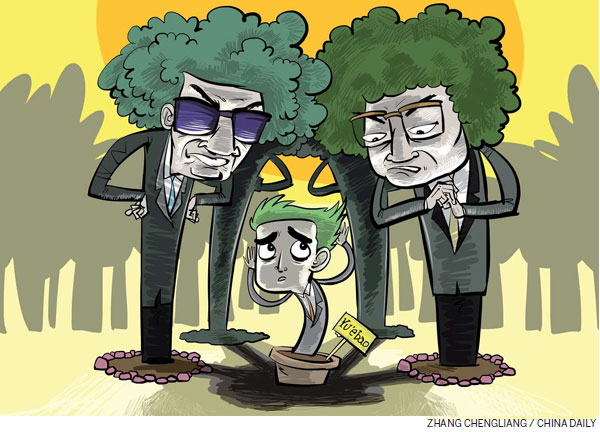Not in the best interest
Updated: 2014-04-04 07:55
By Zhou Feng (China Daily Europe)
|
|||||||||||

Flexing muscles against Internet finance companies does not bode well for market reforms
The recent directives issued by the People's Bank of China, the central bank, seem to be an indicator of the tough times that Internet finance companies are facing in China.
Citing security reasons and concerns about money laundering, the PBOC has red-flagged Alibaba and Tencent's plans to launch virtual credit cards. The central bank also refused permission for the quick response code payment system, a convenient payment option using a mobile phone. Apart from that, the central bank also plans to limit third-party payments by imposing transaction ceilings.
Close on the heels of the central bank directives comes the news that the Big Four state-owned banks have either suspended instant transfers via channels such as Alipay, the payment arm of Alibaba, or set transfer caps of 5,000 yuan ($800) per transfer. Earlier, there were no such limits and the threshold was much higher.
The new directives have also made it harder for investors to transfer large amounts of money from their bank accounts to Internet wealth management platforms such as Yu'ebao. The measures are also expected to reduce the convenience of wealth management products like Yu'ebao and their inherent advantage over similar products launched by the four state-owned banks and other lenders.
The state-owned banks have also limited or banned Alibaba's money market fund product from investing in their contracted deposits. Yu'ebao, which roughly means "leftover treasure", collects small, often idle funds from individuals and invests them in the money market. The scheme offers investors higher returns than ordinary bank deposits and has attracted more than 80 million investors to date. It has also dealt a serious blow to the huge, often cheap deposit base enjoyed by the state-owned banks. It comes as no surprise therefore to see the commercial lenders flexing their muscles against Internet finance companies.

Such measures have come after "promoting the healthy development of Internet finance" was written, for the first time, into the Government Work Report passed by the country's top legislature in March. Mentioning Internet finance in such an important document was seen as giving the sector legal status and as a display of top policymakers' wish to promote reforms through innovation.
But the recent developments shed light on the difficulty of shattering the monopoly of China's banking industry. They also highlight the importance of allowing private investors to set up banks and allowing the existence and growth of diversified, multilayer financial players to cater to the needs of individuals and companies of all sizes.
Internet finance, which mainly serves small business owners and individuals, has brought real competition to the state-owned banking giants, which can make easy money with their monopolistic position, a scenario former premier Wen Jiabao openly criticized in 2012.
Most of all, products such as Yu'ebao, exposed the unreasonable existence of the deposit ceiling and provided a way to circumvent it.
In China, banks can attract deposits at a government-set annualized rate of about 3 percent. Their financing costs are even lower if the demand deposit rate of 0.35 percent is considered. With this advantage and their large networks, banks often monopolize most of China's low-cost capital.
But other financial players, such as fund managers and loan companies, will have to face a market rate of about 8 percent. The gap means that banks can automatically enjoy an interest gap of 5 percentage points.
In such a situation, banks are often the biggest winners, with depositors and other financial players having little to be happy about.
But products like Yu'ebao have changed the distribution of profits by giving depositors more benefits. Most of the money raised by Yu'ebao is reinvested into banks as contracted deposits, and thus allows depositors to enjoy a higher interest rate than regular deposits. With its low investment threshold of 1 yuan (16 cents, 0.11 euro) and super convenience (investors can withdraw their money anytime), Yu'ebao lets depositors know that they don't have to always put their money in banks. The artificially low deposit rate ceiling was also bypassed.
Faced with such prospects, the banks were forced to increase their regular deposit rates to the upper end of the floating band, something they have rarely done since the band was introduced.
In addition, some banks significantly lowered the investment thresholds and increased the liquidity of their wealth management products. For example, Ping An Bank launched a product whose starting investment amount was 0.01 yuan. Earlier, the threshold for similar products was around 50,000 yuan. If investors want to have a slightly higher return rate from banks' wealth management products, the threshold could often be varied.
One thing is, however, certain. Internet finance companies have prompted traditional lenders to raise the quality of services to depositors and investors. The change also represents a major victory for market forces, something China's top leaders have long vowed to pursue.
However, what happened recently showed that the state-owned lenders are taking undue advantage of the authorities' efforts to regulate the market and using their monopoly to strike a hard blow at Internet finance companies.
Their move of limiting or banning Yu'ebao from investing in their contracted deposits was specifically against market rules. If these lenders can accept contracted deposits from other money-market funds, it is not clear why the restriction should apply to Yu'ebao. If these lenders also consider Yu'ebao illegal, then the obvious question is why have such apprehensions been raised only after it reached a particular scale. Clearly, they are taking advantage of their market position to kill off a competitor causing trouble.
If these lenders finally achieve their goal, it will represent a failure of market forces and end up as a case in which vested-interest groups successfully impede reforms.
To prevent that from happening, what the government needs to do is to lean toward innovation of the Internet financial sector, properly mitigate its potential risks and, more importantly, robustly press ahead with financial reforms such as scrapping the deposit rate ceiling and allowing private and foreign investors to play a bigger role in China's banking market.
With banking licenses, private investors will be allowed to draw deposits legally and their cooperation with Internet finance players can pose even greater competition to state banks, prompting state lenders to come down from their high horses.
But authorities should also pay attention to the Internet finance sector to protect the interests of small investors. The task is particularly important as China is facing a rising risk of defaults amid government tightening on credit, efforts to reduce industrial overcapacity and rising local debts.
In January, China Credit Trust barely managed to avoid default of a product linked to the coal industry. On March 7, the country experienced its first corporate bond default after Shanghai Chaori Solar said it was not in a position to repay its investors.
Private business owners, especially some connected to Internet finance, disappearing with massive unpaid debts have hit news headlines recently, causing alarm to investors.
On March 25, a run on a rural bank in Shenyang, eastern China's Jiangsu province, also reflected the fragile sentiment among depositors.
A survey by Coface, a French export credit company, released in February, showed that the corporate payment situation is getting worse. Average credit terms extended in China became longer compared with a year ago, with 11.4 percent of them seeing average credit terms of 120 days or longer, up from 5 percent. Nearly 82 percent of companies that have used credit sales experienced overdue payment, compared with 77.2 percent from a year ago.
Since some Internet finance companies, such as peer-to-peer online financiers, mainly serve small businesses and retail investors, who are often associated with shadow banking and exposed to bigger risk of default, their operations need to be watched.
The author is a Shanghai-based financial analyst. The views do not necessarily reflect those of China Daily.
(China Daily European Weekly 04/04/2014 page10)
Today's Top News
Chinese ships continue hunt for MH370 signals
Xinjiang vows to stop extremism
Australia also detects suspicious pulse signal
Afghans vote amid Taliban scare
Hostages taken to Philippine island
Huawei and China Daily inks co-op
Pulse signal discovered
in MH370 hunt area
Challenges in search for MH370 'unprecedented'
Hot Topics
Lunar probe , China growth forecasts, Emission rules get tougher, China seen through 'colored lens', International board,
Editor's Picks

|

|

|

|

|

|





